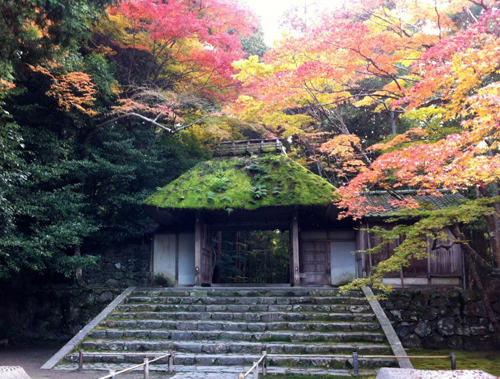Slipping on a Pun About Wet, Fallen Leaves
I've written several times about a man from Osaka who sends me emails in a rarefied Japanese far beyond my comprehension. Here's a recent sample, which he wrote when Japan was still ablaze with autumn colors:
風雅に紅葉狩りと洒落込んでこその濡れ落ち葉なのですが、毎週末は映画館です。
風雅 (ふうが: elegance; refinement); 紅葉狩り (もみじがり: autumn-leaf viewing); 洒落込む (しゃれこむ: to get dressed up); 濡れ落ち葉 (ぬれおちば: wet, fallen leaf); 毎週末 (まいしゅうまつ: every weekend); 映画館 (えいがかん: movie theater)
With the help of a dictionary, I translated the vocabulary as I've done here. I could also grasp that he goes to the movies every weekend. After that I was at a loss. I thought perhaps he was concerned about slipping on wet, fallen leaves if he dressed elegantly!
I turned first to my language partner, then to my proofreader, and between them I've come to understand quite a few things that eluded me before.

Photo Credit: Taisaku Nogi
Shinnyo-do Temple in Kyoto.
• 風雅に (ふうがに: elegantly; in a refined way)
The word 紅葉狩り (which literally means "hunting fall foliage"!) means that you've gone to admire leaves in the mountains. You haven't just taken a walk around the block or strolled through a nearby park. Only people with leisure time can go to the mountains to enjoy fall leaves, so in that sense, it's a refined pastime—hence the use of 風雅に.
• 洒落込む (しゃれこむ: to get dressed up), but "to enjoy" in this context
This one really threw me for a loop. My language partner translated the 洒落込む as "to enjoy." My proofreader then explained that it means either “to be fashionable," which is about the same as "to get dressed up,” or “to do something fashionable,” which is fairly close to “enjoy."
At the root of this word we find another one that I've been meaning to investigate:
お洒落 (おしゃれ: stylish, fashion-conscious, fashionable) to wash, sprinkle + to fall
What's behind this wet word?! According to my proofreader's sources, this ateji term may come from the archaic verb 曝れる, also written as 洒れる (される: to be exposed (to rain, wind and sunlight for a long period of time)). He says that people consider this exposure one way of becoming elegant. Oh, dear. I can only guess that we've ventured into wabi-sabi or shibui territory here, because I know that if someone left me out in the elements for a long time, there's no way I would emerge looking elegant.

Photo Credit: Taisaku Nogi
Honen-in Temple in Kyoto.
• 濡れ落ち葉 (ぬれおちば: retired man (who clings to his wife, just as a wet, fallen leaf sticks to a person))
I think this was the most confusing term of all, largely because my overly literal mind kept telling me that my correspondent was actually talking about leaves here. After all, he had already referred to leaf viewing; it seemed logical that the discussion would remain in the tangible, visible world of leaves.
But no. Since about 1989, according to Daijisen, the Japanese have jokingly referred to retired men as 濡れ落ち葉. From the wife's point of view, the retired man who sits around the house is a useless nuisance. He seems to do nothing but cling to her in an annoying way, just as a wet, fallen leaf sticks to a person.
An equivalent term for retired husbands is 粗大ゴミ (そだいゴミ: giant garbage). I learned this term years ago from Womansword: What Japanese Words Say About Women (Kodansha: 2002). The author, Kittredge Cherry, refers to this term as "the cruel slang of the 1980s" and notes that the Mainichi newspaper printed more than 60 letters about this controversial word in 1984. My male proofreader deems 粗大ゴミ "too frank and straightforward," indicating that 濡れ落ち葉 is preferable.
Still, that can't be why my Osaka friend chose the term. Clearly, he was making a clever play on words. As a sticky, wet leaf in his wife's domain, he said, it's only natural that he should view leaves on the weekends. However, the mountains are far away, whereas the theater is much more convenient, so he watches movies instead.
Aha, this one sentence (and only one!) has finally become clear! Here it is again, along with a translation and with definitions tailored to this particular context:
風雅に紅葉狩りと洒落込んでこその濡れ落ち葉なのですが、毎週末は映画館です。
Since I’m a retired man—a sticky wet, fallen leaf, as they say—I’m supposed to enjoy
fall foliage in a refined way. Instead, I go to the movies every weekend.
風雅 (ふうが: refinement); 紅葉狩り (もみじがり: autumn-leaf viewing); 洒落込む (しゃれこむ: to enjoy); 濡れ落ち葉 (ぬれおちば: wet, fallen leaf; retired man); 毎週末 (まいしゅうまつ: every weekend); 映画館 (えいがかん: movie theater)
Stunning fall foliage is one of those things that makes life worth living. But so are movies—maybe even more so!

Photo Credit: Taisaku Nogi
Shoshazan Engyo-ji in Himeji (Hyogo Prefecture)
Today, on the solstice, we make a shift. We officially stop hunting for fall foliage and start hunting for holiday desserts! Accordingly, I've just released essay 1047 on 菓 (confection; cake; sweets). A sneak preview:

This is the final essay of the year, just as you're reading the last JOK Notebook post of 2012. Joy o' Kanji will swing into action again on January 11, 2013, when I hope to be full of energy after a long break.
Have a restful and JOYOus holiday!


Comments